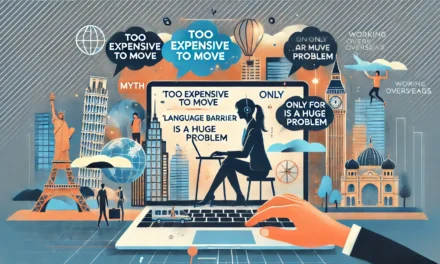Are you considering relocating to another country in search of job opportunities? If so, you are far from alone! Moving overseas is becoming increasingly popular as more and more people realise the potential benefits that come with going abroad for employment. But what should you know before making this move? In this blog post we’ll be exploring the pros and cons of relocating overseas for a career opportunity – helping you make an informed decision about whether or not pursuing “destination careers” is right for you. Read on for fascinating insights into why moving abroad may (or may not) be worth it!
The Benefits of Moving Overseas for Work – Increased Cultural Awareness, Expanding Your Professional Network, and Financial Gains
Moving overseas for work is an adventurous and life-changing experience that offers numerous benefits. One of the most significant benefits is the opportunity to embrace new cultures and broaden your worldview. By immersing yourself in a new environment, you will develop an appreciation for unique customs and traditions. This increased cultural awareness translates into a higher level of empathy, greater tolerance, and stronger cultural competency skills. Moreover, moving abroad for work allows you to create new relationships and expand your professional network. You will meet people from diverse backgrounds and industries, which will expose you to new ideas and perspectives. Finally, living overseas presents exciting financial opportunities, such as higher salaries, lower taxes, and lower costs of living. These benefits and more make moving overseas for work an enriching and fulfilling experience.

Considerations Before Making the Move – Research Local Job Market and Living Conditions, Education Opportunities for Family Members, and Potential Visa Requirements
Making a move to a new city or even a new country can be an exciting but daunting task. Before taking the leap, it’s important to research the local job market and living conditions to ensure that you will be able to support yourself and your family in your new home. Additionally, if you have children or other family members who will be moving with you, it’s essential to look into education opportunities and ensure that their needs will be met. Finally, it’s important to research potential visa requirements and ensure that you have all the necessary documents in order before making your move. Taking the time to consider these key factors can help to ensure that your move is smooth and successful.
Finding Work Abroad – Assessing Your Skillset and Experience, Professional Resume Tailoring, and Utilising Online Platforms
Exploring the world while earning a paycheck at the same time is the dream for many of us. While it may seem daunting at first, finding work abroad is within reach with the right approach. Start by assessing your skillset and experience to identify what unique value you can offer an employer. Don’t forget to tailor your professional resume to the specific job and country you’re interested in. This will increase your chances of being noticed by potential employers. Lastly, make use of online platforms to search for job opportunities and network with professionals in your target country. With persistence and an open mind, you’ll be on your way to an exciting new chapter in your career and personal life.
Logistics of Moving Overseas – Securing Accommodation, Shipping Household Belongings, Dealing with Finances from Home Country
Moving overseas can be an exciting and daunting experience all at once. Securing accommodation, shipping household belongings, and dealing with finances from your home country are some of the major logistics to consider. Finding a suitable place to live is crucial to ensure a smooth transition into your new life. It’s important to research the local rental market and find a trustworthy landlord or agency. As for shipping household items, it can be a costly venture but hiring a reputable company will provide peace of mind for your belongings. Additionally, dealing with finances from your home country can be a challenge. Setting up an international bank account and notifying your credit card companies of your move can make a big difference in avoiding any financial hiccups. Overall, planning ahead and doing your research will help ease the process of moving overseas.
Adjusting to a New Working Environment – Making Friends in the Office and Out of It, Understanding Cultural Etiquette in Business Situations, Combating Homesickness
Starting a new job always comes with an adjustment period, particularly when it comes to getting accustomed to the working environment. Aside from getting to grips with your new role and responsibilities, you may also struggle with the social aspects of fitting in with your new colleagues. Building relationships with your coworkers is important for navigating a successful career, both in and outside the office. In addition to making connections with your colleagues, it’s important to consider the cultural etiquette of your new business surroundings. This can include everything from understanding the hierarchies within the company or industry to showing respect towards unique customs and traditions. Another common hurdle when adjusting to a new working environment is homesickness, especially if you have moved to a new city or country. Finding ways to cope with this challenge is crucial for your mental wellbeing and success in your new role. Make sure to put aside time for self-care and keep in touch with family and friends outside of work. It may take some time to settle in, but with patience and perseverance, you can thrive in your new workplace.

Keeping Up with Industry Changes Back Home – Continuing Education Opportunities for Professionals Abroad, Developing Long-Distance Relationships with Colleagues at Home
As professionals who have relocated abroad, it can be challenging to keep up with the latest industry changes back home. However, there are plenty of opportunities for continuing education that can help us stay on top of new developments and innovation in our field. Additionally, developing long-distance relationships with our colleagues back home can provide insight into local trends and practices, as well as provide opportunities for collaboration on projects and new ideas. Through these efforts, we can remain connected to our industry, wherever we may be located in the world.
While it can be an intimidating prospect to move overseas for work, the reality is that the benefits of doing so – gaining financial stability, increasing cultural awareness, and expanding your professional network – are often worth the effort. Finding the right job in a foreign country doesn’t have to be overwhelming, either. Start by assessing your skills and experience, tailoring your resume appropriately, and utilising various online platforms to aid in your research. When actually making the move from one country to another, prepare yourself logistically by considering factors like securing accommodation, shipping household belongings safely, and managing finances back home. Adapting to a new work culture will naturally take time but building relationships with colleagues at both work and home can make this process much easier. Finally, don’t forget to stay up to date with industry developments back home by looking into continuing education opportunities abroad and maintaining strong connections with those still working closer to home. Ultimately, with a bit of preparedness beforehand and dedication upon arrival overseas for work can be one of the most rewarding experiences you ever embark on!








 </a
</a